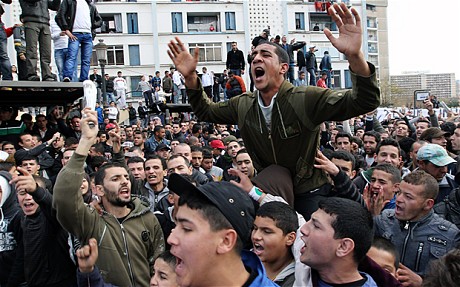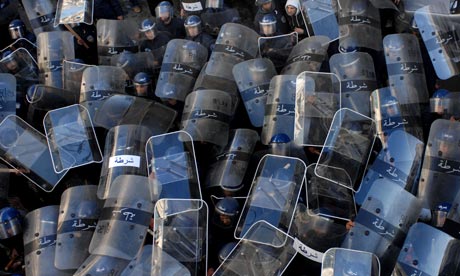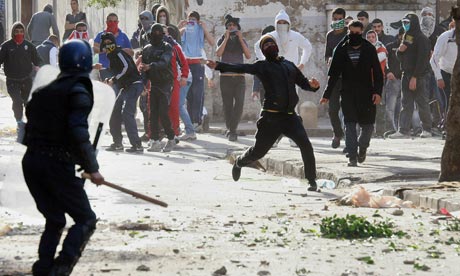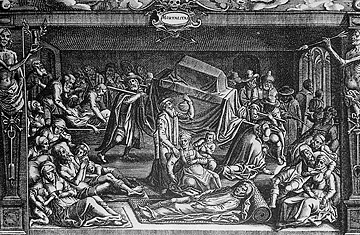– ‘Visas, Mr President!’ Algerians surround Macron, demand French visas (VIDEO)
* * *
PayPal: Donate in USD
PayPal: Donate in EUR
PayPal: Donate in GBP
The man who trades freedom for security does not deserve nor will he ever receive either. – Benjamin Franklin
#Maroc construit un mur entre Maroc & Algérie de 150km
No comment des médias @libe @BFMTV @RTBF #trump bashinghttps://t.co/5zNFUitdYN pic.twitter.com/e4eRCIvUm3— Xavier Paul (@XavierPaul_) January 29, 2017
* * *
PayPal: Donate in USD
PayPal: Donate in EUR
PayPal: Donate in GBP
– Morocco, Algeria ‘must take back rejected refugees’ – German economy minister:
North African countries, such as Morocco and Algeria, must take back their citizens whose asylum applications are rejected by Germany, economy minister and Social Democratic Party (SPD) leader Sigmar Gabriel has stated.“Germany is willing to economically help these countries, but only if their governments act fairly and let citizens who have no right to [be granted] asylum in our country enter their territories,” Gabriel said in an interview with the ARD ‘Tagesthemen’.
“It cannot be that one receives [development] aid, but does not accept back its own citizens who can’t get asylum in our country because they simply have no reason to flee their country,” Gabriel added.
…
Related info:
– Intel’s New Mobile Chips Are Always Listening
– Russia To Swap Intel-AMD Processors For Local Technology
– First Cisco And Microsoft, Now IBM: China Orders Banks To Remove High-End IBM Servers
– Russian researchers expose breakthrough U.S. spying program (Reuters, Feb 16, 2015):
The U.S. National Security Agency has figured out how to hide spying software deep within hard drives made by Western Digital, Seagate, Toshiba and other top manufacturers, giving the agency the means to eavesdrop on the majority of the world’s computers, according to cyber researchers and former operatives.
That long-sought and closely guarded ability was part of a cluster of spying programs discovered by Kaspersky Lab, the Moscow-based security software maker that has exposed a series of Western cyberespionage operations.
Kaspersky said it found personal computers in 30 countries infected with one or more of the spying programs, with the most infections seen in Iran, followed by Russia, Pakistan, Afghanistan, China, Mali, Syria, Yemen and Algeria. The targets included government and military institutions, telecommunication companies, banks, energy companies, nuclear researchers, media, and Islamic activists, Kaspersky said. (reut.rs/1L5knm0)
Read moreRussian researchers expose breakthrough U.S. spying program
– Yet More Snow for Turkey, Jerusalem This Weekend:
Snow totals for western and central parts of Turkey and down to the city of Jerusalem
– Greek islands buried under 6½ ft (2 m) of snow – Video:
At least 8 villages isolated – Normally sun-drenched islanders lose power and water
– Up to 5 feet (1½ m) of snow to hit western New York:
SNOWFALL RATES…OVER 3 INCHES PER HOUR AT TIMES.
– Romania – Coldest morning in 50 years:
It feels like a Siberian winter in Romania.
– The Eight Families’ Rigged Oil Game (Veterans Today, May 13, 2014):
After World War II – during which Royal Dutch Shell Chairman Sir Henry Deterding loudly supported the Nazis, while Exxon and Texaco collaborated with the Nazi I.G. Farben combine – the Four Horsemen turned their full attention to the Middle East. There the cartel operated under names like Iranian Consortium, Iraqi Petroleum Company and ARAMCO.With the rise of the Organization of Petroleum Exporting Countries (OPEC) as a producer cartel, the companies devised increasingly sophisticated ways to diminish OPEC’s collective bargaining ability.
Nationalistic governments were destabilized, discredited and overthrown by the CIA at the behest of Big Oil. Henry Kissinger set up his International Energy Agency (IEA), which the French called a machine de guerre.

Muammar Gaddafi’s second wife, Safia, and three of their children had been living in Algeria since fleeing Libya in 2011. Photograph: Khaled El-Fiqi/EPA
– Muammar Gaddafi’s wife and three children go missing from Algeria (Guardian, March 25, 2013):
Libyan officials are trying to locate Muammar Gaddafi’s wife and three of his children who are missing from their refuge in neighbouring Algeria.
Algeria confirmed the late dictator’s second wife, Safia, daughter Aisha, and sons Hannibal and Muhammad had fled the upmarket coastal region of Staoueli, close to Algiers, where they had lived since fleeing Libya in 2011.
Oman and Venezuela had both reportedly previously offered members of Gaddafi’s family asylum, and officials say it is also possible they have joined former Gaddafi fighters in Mali.
Gaddafi’s most prominent son, Saif al-Islam, remains in custody in the Libyan town of Zintan, and his brother Saadi is under house arrest in Niger.
Read moreMuammar Gaddafi’s Wife And Three Children Go Missing From Algeria
– Algeria launches ‘final assault’; 7 hostages dead (USA Today, Jan 19, 2013):
AIN AMENAS, Algeria (AP) — Algeria’s special forces stormed a natural gas complex in the middle of the Sahara desert in a final assault Saturday, killing 11 militants, but not before they in turn killed seven hostages, the state news agency reported.
The report, quoting a security source, didn’t specify if any hostages or militants remained alive or give the nationalities of the dead.
– Mali Islamists tougher than France anticipated: envoys (Reuters, Jan 18, 2013)
French troops’ initial clashes with Islamist militants in Mali have shown that the desert fighters are better trained and equipped than France had anticipated before last week’s military intervention, French and other U.N. diplomats said.
The realization that the fighting could be bloodier than anticipated in the weeks — or months — ahead might make Western countries even more reluctant to get involved alongside France. French officials, however, hope it will rally their allies behind them, diplomats say.
“The cost of failure in Mali would be high for everyone, not just the people of Mali,” an African diplomat said on Thursday. Like the other diplomats, he spoke on condition of anonymity to discuss sensitive military and diplomatic issues.
– Malgeria Crisis Update (ZeroHedge, Jan 17, 2013):
The situation in MalgeriaTM continues to remain uncertain but the following updates should provide some color as to where they stand currently (and a primer on the initial French intervention). Critically, Stratfor warns that the escalation in Algeria will possibly lead to further militants crossing the Mali border, further endangering Westerners and energy infrastructure (which is important as Algeria is one of the largest exports of light, sweet crude oil in the world and a significant natural gas exporter to Europe).
Stratfor 3-minute Primer:
Update:
1) In general there is chaos as FranceTV put it “it is very confusing, with no official confirmation of any of the actions being reported on”
2) Up to 35 (of the 44) Hostages have apparently been killed in the Algerian rescue (retake) operation, with hostages freed (one Irishman);
2a) All 8 of the hostage-takers have apparently been killedWho is Mokhtar Belmokhtar?
3) A US Drone is now on site to take a look for the first time;
See also:
– US Deploying Troops To 35 African Countries
Watch the Keiser Report down below.
– The War On Terror Spreads to Africa: U.S. Sending Troops to 35 African Nations (ZeroHedge, Jan 12, 2013):
The U.S. is sending troops to 35 African nations under the guise of fighting Al Qaeda and related terrorists.
Democracy Now notes:
U.S. Army teams will be deploying to as many as 35 African countries early next year for training programs and other operations as part of an increased Pentagon role in Africa. The move would see small teams of U.S. troops dispatched to countries with groups allegedly linked to al-Qaeda, such as Libya, Sudan, Algeria and Niger. The teams are from a U.S. brigade that has the capability to use drones for military operations in Africa if granted permission. The deployment could also potentially lay the groundwork for future U.S. military intervention in Africa.
NPR reports:
[A special American brigade] will be able to take part in nearly 100 separate training and military exercises next year, in nearly three dozen African countries
Glenn Ford writes:
Read moreThe War On Terror Spreads To Africa: U.S. Sending Troops To 35 African Nations
– Russia halts plans to supply S-300 missile system to Syria – reports (RT, June 27, 2012):
Russia’s main weapons producer has allegedly suspended its contract with Syria to supply S-300 long-range missile systems. Russia’s ‘Vedomosti’ daily published the report, citing unnamed sources within the military-industrial complex.
The very fact of the contract’s existence was not known until it was revealed in an annual report made only last week and published online by the makers of the S-300 systems, Almaz-Antey.
The report states that the company’s largest contracts are with Algeria (which is paying $39 million for a long-range missile defense system), and Syria, which signed a contract for the same system for $105 million.
The report also says that deliveries on the Syrian contract are expected to be made between 2012 and 2013. But ‘Vedomosti’ claims two separate sources, who chose to remain anonymous, have said deliveries have been put on the back-burner “after a direct order from above.”
It’s unclear whether these reports are true, but many are already speculating on the potential reasons for such a step. Some have suggested that Moscow has decided to placate Washington and Tel Aviv, drawing parallels between this situation and the one back in 2010, when Russia cancelled its contract for the same missile system with Iran.
Read moreRussia Halts Plans To Supply S-300 Missile System To Syria – Reports
Added: 16. February 2011

Algerian protesters chant slogans during a demonstration in Algiers Photo: EPA
Plastic bullets and tear gas were used to try and disperse large crowds in major cities and towns, with 30,000 riot police taking to the streets in Algiers alone.
There were also reports of journalists being targeted by state-sponsored thugs to stop reports of the disturbances being broadcast to the outside world.
But it was the government attack on the internet which was of particular significance to those calling for an end to President Abdelaziz Boutifleka’s repressive regime.
Protesters mobilising through the internet were largely credited with bringing about revolutions in Egypt and Tunisia.
“The government doesn’t want us forming crowds through the internet,” said Rachid Salem, of Co-ordination for Democratic Change in Algeria.
“Security forces are armed to the teeth out on the street, and they’re also doing everything to crush our uprising on the internet. Journalists, and especially those with cameras, are being taken away by the police.” President Hosni Mubarak had tried to shut down internet service providers during 18 days of protest before stepping down as Egyptian leader on Friday.
See also:

Algeria protests Riot police use their shields during a demonstration in Algiers last month. Photograph: AP
Algeria, the oil-rich, military-dominated north African state, braced itself for a day of pro-democracy protestson Saturday, despite a ban on demonstrations in the capital, Algiers, and a large security presence intent on containing any uprising inspired by Egypt or Tunisia.
A key energy exporter and the biggest country in the Maghreb, Algeria used its powerful armed forces last month to contain several days of rioting, triggered by price rises for sugar and cooking oil. At least five people died and around 800 were injured in demonstrations against youth unemployment, poor housing and corruption, including several people who set themselves alight.
Now a hastily formed umbrella group of civil associations, independent trade unionists and small political parties has called for a national day of protest on Saturday , under the slogan “Changing the system”. It is calling for an end to 12 years of authoritarian rule by Abdelaziz Bouteflika and his generals.
In an effort to stop mass protests, Bouteflika said he would use the country’s vast oil and gas wealth to lower the prices of key foods. He also promised to allow more democratic freedoms, create jobs and lift a 19-year-old state of emergency that still hangs over the country.
Read moreAlgeria Prepares For Day of Protests – Is Algeria Next?
Dow Jones reports that wheat futures just hit a 29-month highs on “strong global demand.”
Per the newswire, Algeria bought 800,000 tons of milling wheat, with traders estimating the nation’s purchases for January at about 1.8M. Turkey and Jordan bought wheat last week after rising food prices helped fuel unrest in Tunisia.
“They’re saying, ‘Boy we’ve got to eat. We don’t know where wheat is going to be in a month,’ says PFG Best. CBOT March wheat ends up 18 1/4c at $8.56 1/2 a bushel, while KCBT March climbs 22 1/2c to $9.40 and MGE March jumps 21c to $9.77.
The chart shows the UBS Bloomberg constant maturity Wheat index which confirms the vicious loop of what surging prices and geopolitical instability means to wheat prices.
The higher the prices, the greater the scramble by developing (and soon developed) countries to acquire as much wheat as possible and hoard it, hoping to avoid Tunisia’s fate, which of course will lead to even greater price surges. And all of this ignores the impact of the Goblin in Chief, whose money printing fetish has earned him, in our books, the adjective ‘genocidal’.
Once China figures out what is going on, and rice prices finally explode as we fully expect they will, the world will figure out just why…The only silver lining – soon farming will be the most profitable profession in the world. And as bankers only go where the money is, Bernanke’s strategy may in fact lead to the first net natural outflow of bankers from Wall Street in history.
See also:
– Algerian Riots Continue Over Skyrocketing Food Prices And Unemployment:
The cost of flour and salad oil has doubled in recent months, reaching record highs. A kilogram of sugar, which a few months ago cost 70 dinars, is now 150 dinars (£1.28). Unemployment stands at about 10% percent, the government says; independent organisations put it closer to 25%.
The Fed chairman is 100% confident inflation can be contained. Rapidly spreading rioting (5 countries so far) would take the under on that.
Latest on Tunisia:
Twelve people were killed in overnight clashes in the Tunisian capital Tunis and the northeastern town of Ras Jebel, according to accounts from two medical sources and a witness on Friday.
Ten of the victims were killed after clashes in the capital, two sources from Charles Nicolle hospital told Reuters.
A witness from Ras Jebel, who identified herself as Narjes, said: “I saw two dead people with my own eyes after police fired at youth”.
Tunisian officials could not immediately be reached for a comment. It was not immediately clear whether the shootings took place before or after the country’s president ordered police to stop using lethal force against demonstrators.
And now the violence has spread to Jordan:
Food price protests sweeping across North Africa and the Middle East reached Jordan on Friday, when hundreds of protesters chanted slogans against Prime Minister Samir al-Rifai in the southern city of Karak.
The peaceful protest was held despite hastily announced government measures to curb commodity and fuel prices. Similar demonstrations were held in three other towns and cities across the country, witnesses said.
“We are protesting the policies of the government — high prices and repeated taxation that made the Jordanian people revolt,” Tawfiq al-Batoush, a former head of Karak municipality, told Reuters at the protest outside Karak’s Al Omari mosque.
Three days ago, after riots in Algeria and Tunisia over high prices, unemployment and falling living standards, Jordan announced a $225 million package of cuts in the prices of some types of fuel and of staple products including sugar and rice.
Other Arab countries have taken similar steps. Libya abolished taxes and customs duties on food products and Morocco offered compensation to importers of soft milling wheat to keep supplies stable after a surge in grain prices.
…Morocco (google translated)
Protests against price rises and unemployment moved from Tunisia to Morocco, where the streets of Rabat, yesterday, saw clashes between young protesters and police forces, which tried to prevent them from organizing a demonstration outside the Moroccan parliament, in protest against unemployment and high prices and the cost of living in Morocco
And Yemen:
In Yemen, Yemeni President Ali Abdullah Saleh fired Minister of Oil and Chief Executive, the Yemen Petroleum Company Omar Arhabi, yesterday, due to a lack in the supply of petroleum products, not available in the market, which led to bottlenecks in front of gas stations and the creation of indignation among the citizens.
Not like there is much to add here, but we would like to add that if a rising stock market was indiciative of “wealth” then the citizens of Zimbabwe have to be the richest people in the universe.
Read moreFood And Fuel Riots in Algeria, Tunisia, Morocco, Yemen And Jordan

Protesters throw stones in the Belcour district of Algiers. Photograph: Fayez Nureldine/AFP/Getty Images
Fresh rioting broke out in Algiers today as police were deployed around mosques and football matches were suspended after protests over food prices and unemployment.
Riot police armed with teargas and batons maintained a strong presence around the Algerian capital’s main mosques. In the popular Belcourt district, rioting resumed after Friday prayers. Young protesters pelted police with stones and blocked access to the area.
The official APS news agency said protesters ransacked government buildings, bank branches and post offices in several eastern cities overnight, including Constantine, Jijel, Setif and Bouira. In Ras el Oued this morning, buildings belonging to the state-run gas utility Sonelgaz, the council and the tax authority were seriously damaged along with several schools, APS reported.
Earlier this week hundreds of youths clashed with police in several cities and ransacked stores in the capital. Police used teargas to disperse youths in the Algiers neighbourhood of Bab el-Oued, where the most violent protests occurred.
The Algerian Football Federation said today’s league fixtures would be postponed to prevent the organisation of rallies, which the country has banned under an emergency law in force since 1992.
The cost of flour and salad oil has doubled in recent months, reaching record highs. A kilogram of sugar, which a few months ago cost 70 dinars, is now 150 dinars (£1.28). Unemployment stands at about 10% percent, the government says; independent organisations put it closer to 25%. Official data put inflation at 4.2% in November.
Read moreAlgerian Riots Continue Over Skyrocketing Food Prices And Unemployment

Vladimir Putin (left), then the president of Russia, met with Muammar Qaddafi, the Libyan leader, in April to discuss arms, energy and debt. AFP
Employing strategies redolent of a new Great Game, Russia has stepped up its diplomatic and trade activities in the Middle East and North Africa in a bid to enhance its geopolitical clout and gain access to, and at least partial control over, the region’s oil and gas reserves.
Among the former global superpower’s tactics: linking arms deals and debt-forgiveness to energy deals.
The strategy has been most apparent in former client states of the Soviet Union including Libya, Iraq and Syria, although by no means limited to such countries. Moreover, Moscow has not shied away from courting the authoritarian regimes of countries such as Iran, Syria and Libya that are or have been shunned by the US and other western governments.
BRUSSELS: President Nicolas Sarkozy of France and Chancellor Angela Merkel of Germany will end months of wrangling Thursday by presenting a joint plan to strengthen Europe’s ties with countries on its southern borders.
Read moreSarkozy and Merkel draft agreement detailing role of nations on EU’s southern border
Victims of the plague during the 1574 Siege of Leiden by the Spaniards black death black plague bubonic plague

Like no other disease, plague evokes terror. One of the most lethal illnesses in human history, it killed probably a third of Europe’s population in the 14th century. It may also have been one of the first agents of biological warfare: It’s said that in the 1340s, invading Mongols catapulted their plague dead over the city wall into Kaffa in the Crimea.
Yet the plague is not just a disease of the distant past. While cases tapered off in the mid-20th century, the World Health Organization (WHO) now classifies plague as “re-emerging.” No one is predicting another pandemic like the Black Death that devastated Europe. The WHO now records at most only a few thousand cases worldwide per year; and, if detected early, the disease can be treated effectively with antibiotics. But since the early 1990s, plague has returned to places – including India, Zambia, Mozambique, Algeria and parts of China – that had not seen it in many years or even decades.